Part 30: Fit The Twenty-Seventh : This Sporting Life
Fit The Twenty-Seventh : This Sporting Life
The confirmation that the city would be building a sports stadium had excited a lot of the residents, particularly the fans of the Rovers. The buzz was accompanied by a great deal of speculation about where it would be built, with many of the crazier residents reckoning it should be built on Grenade Island. While I was pretty dubious about that idea, I tried to call up Connie to run a few ideas passed her. As it turned out, she was out at some conference upstate, so her second-in-charge came in her place.
 I don't think we've met before.
I don't think we've met before. Hhmm! Mmmmhh nmmzh mmmrrrgtrooid!
Hhmm! Mmmmhh nmmzh mmmrrrgtrooid! Uhh, Murgatroyd?
Uhh, Murgatroyd?Murgatroyd nodded.
 Mmmfff gdddmf zptch mmpuddamon!
Mmmfff gdddmf zptch mmpuddamon! Right. I can't understand a word you saying.
Right. I can't understand a word you saying.Murgatroyd frowned and then rolled his eyes up, like he was thinking deeply about something.
 Sorry about that, it takes a while for my mouth to get going in the mornings.
Sorry about that, it takes a while for my mouth to get going in the mornings. Ah, OK. Right. Can we get onto this stadium thing?
Ah, OK. Right. Can we get onto this stadium thing? Oh yes, of course. Well, there's plenty of places you could put it, but we can't put it on the island.
Oh yes, of course. Well, there's plenty of places you could put it, but we can't put it on the island. Oooh, why not?
Oooh, why not? There's a convenant on Grenade Island owing to its unique character, which means that any construction that's carried out on it has to conform to strict environmental guidelines which are explicitly laid out in the Environmental Heritage Act of 1957, Clause 24, subsection C. And when you're put down a stadium, you have to provide transportation, electricity and water and sanitation to the facility in a manner that conforms to subsections D and E as well, plus a special bills would have to be passed through both the state and national legislatures. And because of the deepness of the harbour, these requirements would be extremely hard to conform with...
There's a convenant on Grenade Island owing to its unique character, which means that any construction that's carried out on it has to conform to strict environmental guidelines which are explicitly laid out in the Environmental Heritage Act of 1957, Clause 24, subsection C. And when you're put down a stadium, you have to provide transportation, electricity and water and sanitation to the facility in a manner that conforms to subsections D and E as well, plus a special bills would have to be passed through both the state and national legislatures. And because of the deepness of the harbour, these requirements would be extremely hard to conform with... Oh fuck it this is too hard, are there any impediments to me just sticking the damn thing in the middle of town?
Oh fuck it this is too hard, are there any impediments to me just sticking the damn thing in the middle of town? Absolutely none.
Absolutely none. Right, we're doing that then.
Right, we're doing that then.
We could've waited another year to pay for the stadium from our cash, but I didn't see anything wrong with taking out a small loan to speed things up in time for the Rovers' next domestic season.
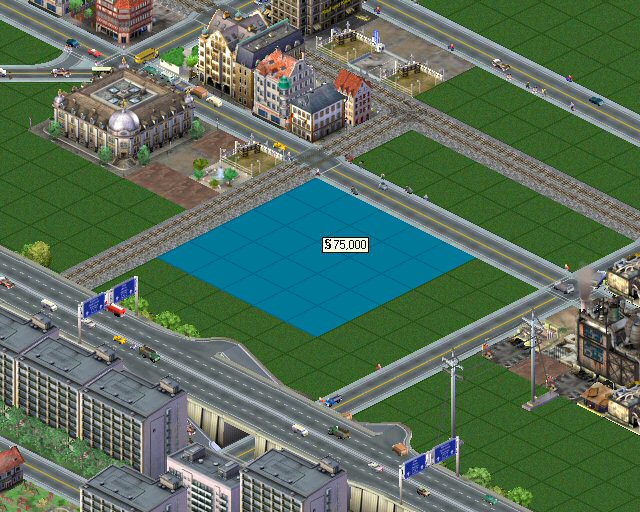
And, so, to the disappointment to all the kooks who loved the idea of travelling to games drunk and slightly seasick, I approved construction for a location a bit more convenient to town.
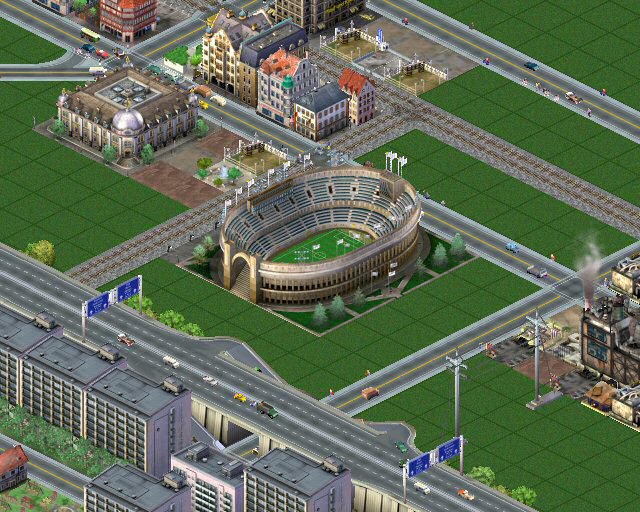
Near to both the freeway and the railway, on which a dedicated station would be built, it would be accessible to most of the population.
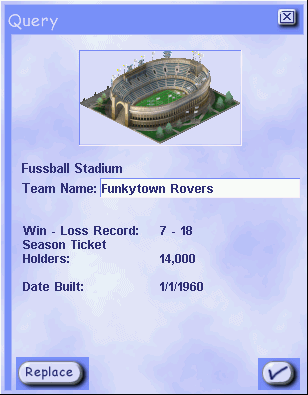
So the Rovers had their stadium. Of course they narrowly avoided relegation in their first year in the top flight but they survived.
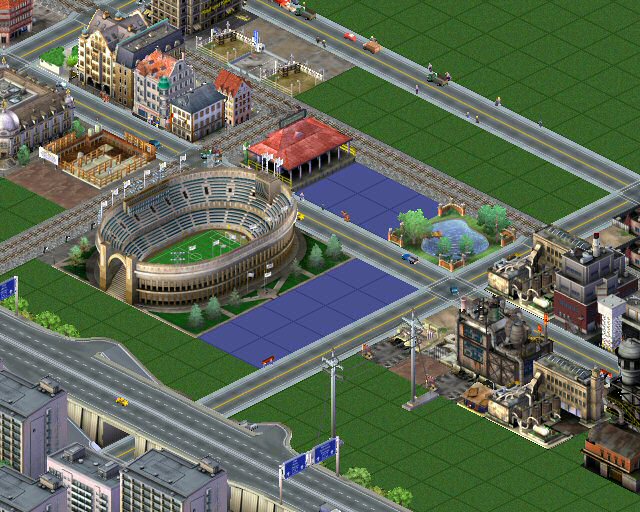
It made sense to allow businesses to build up nearby, it was a bit close to the industrial area but even those were slowly getting cleaner.
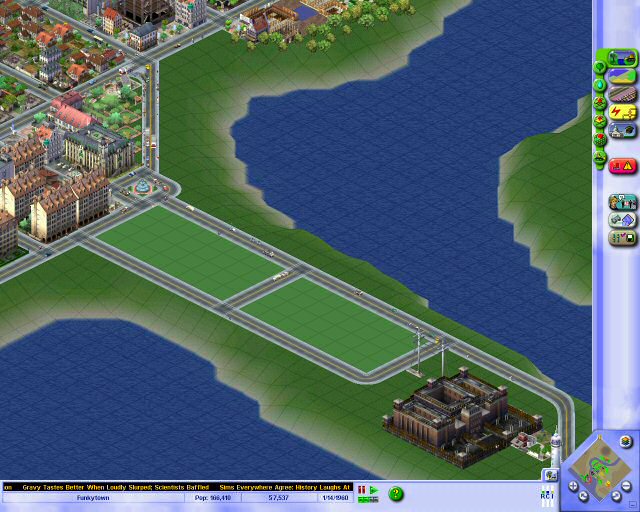
Meanwhile, the settlement of the west of the harbour continued, extending onto Penisula itself.
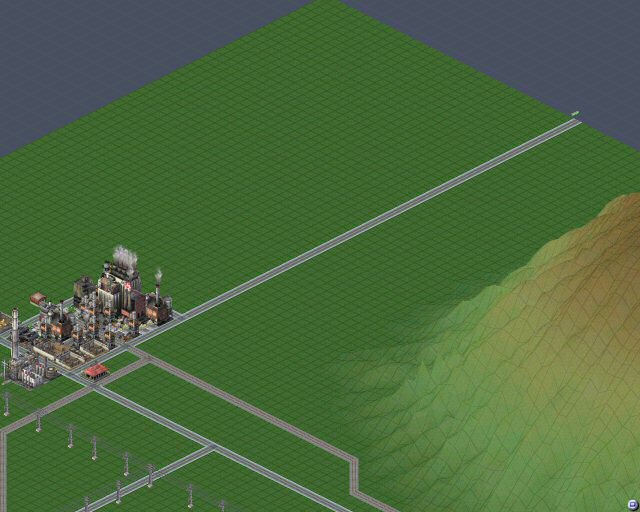
Another road was built out to City Name out the back of the caldera.
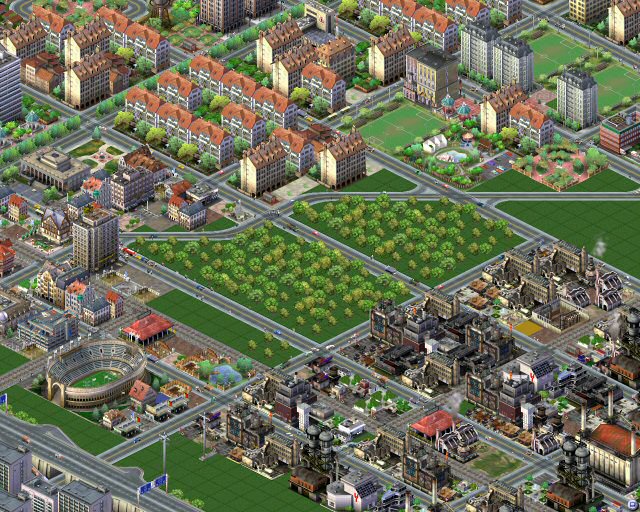
A portion of the green belt was planted out with trees, to add to the lungs of the city.
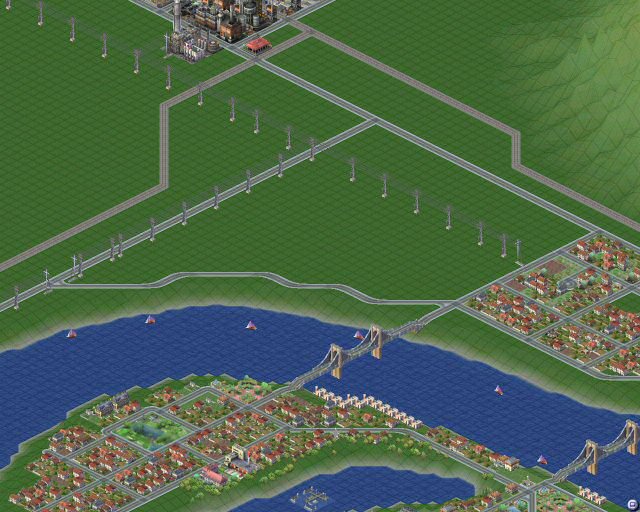
A new road was laid out alongside the riverside on the northern bank. That part of the world would be subdivided fairly soon.
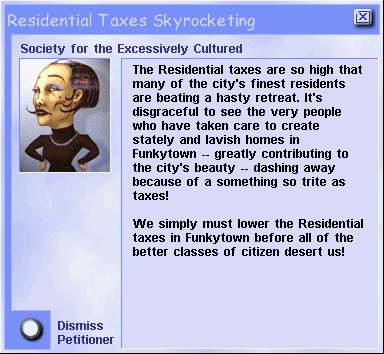
Other days, things happened according to routine. Residents complained about high taxes.
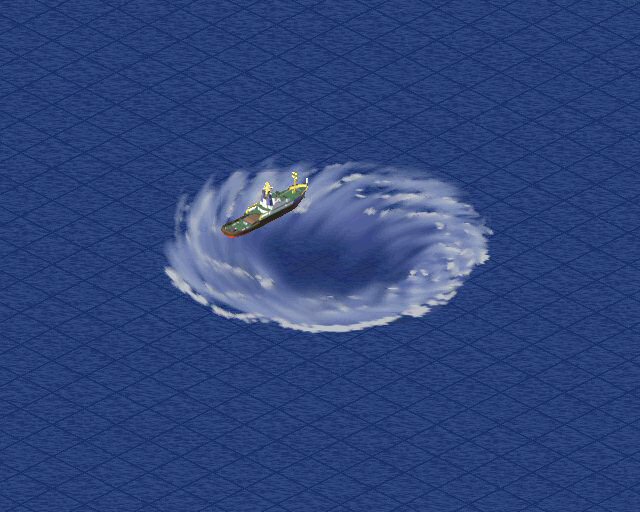
Freighters were swallowed by whirlpools.
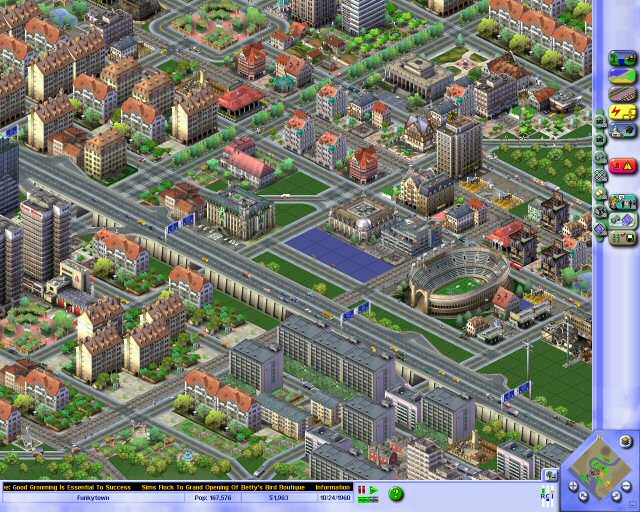
The middle of the city continued to get dicked around with.
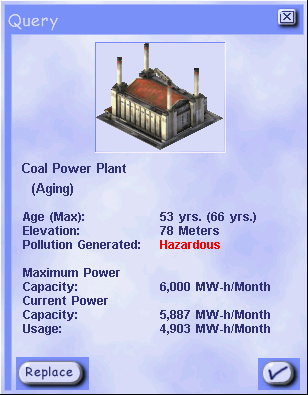
The first power plants were starting to break down more and more often, and since I could replace them with cleaner technologies, I was kind of glad that they'd be decommissioned soon.

With such a healthy bottom line, partially due to the increased affluence of the city...

... I figured the residents were entitled to some tax relief, so I dropped taxes to 6%.
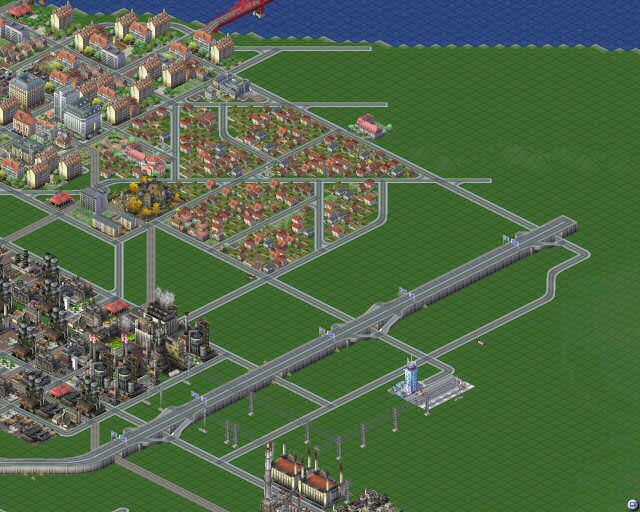
Of course the freeway project continued...
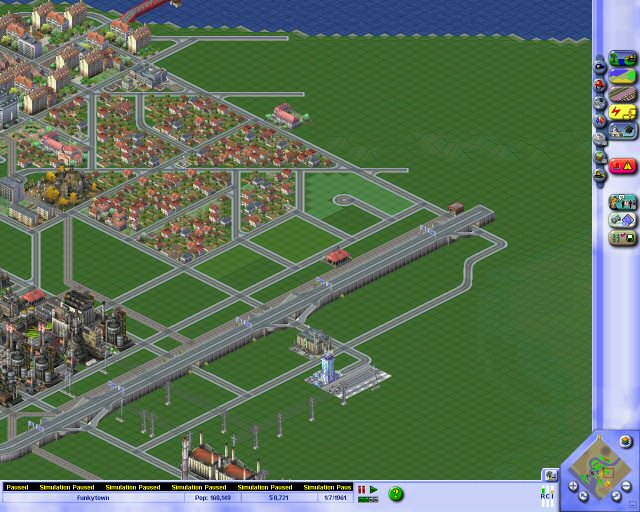
... and suburbia followed in its wake.
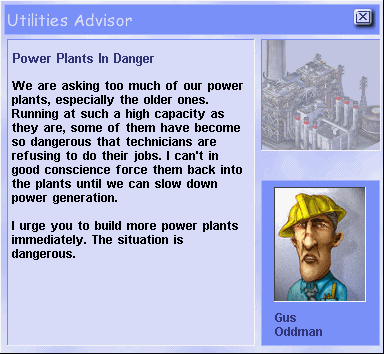
... pushing the power infrastructure to the brink once more.
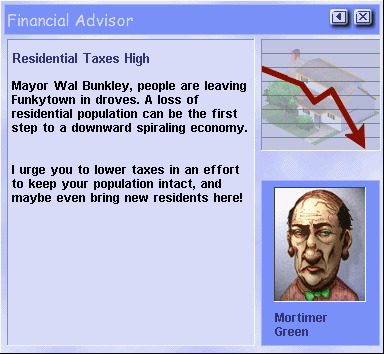
And, wait, that's not how it's supposed to work. I just gave them a tax cut! And a stonking big stadium!
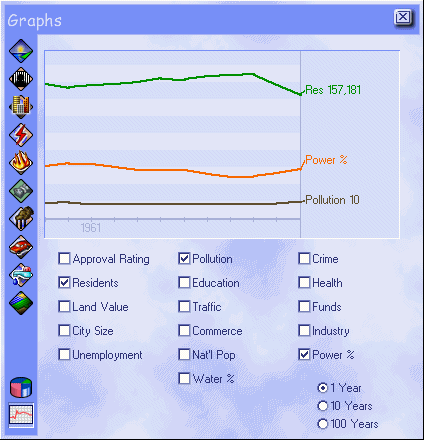
Ingrates.
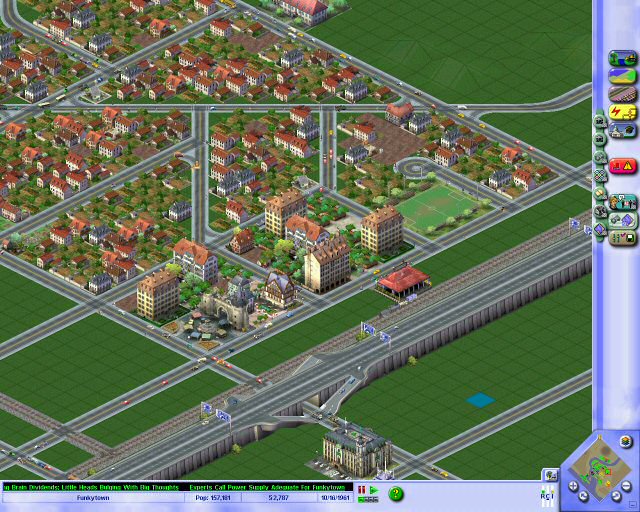
Anyway, while people moved out, more people would move in in their place. A temporary setback, really.

This year's bottom line wasn't so impressive, but that happens when you have 30 thousand move out in a couple of months for no discernible reason.
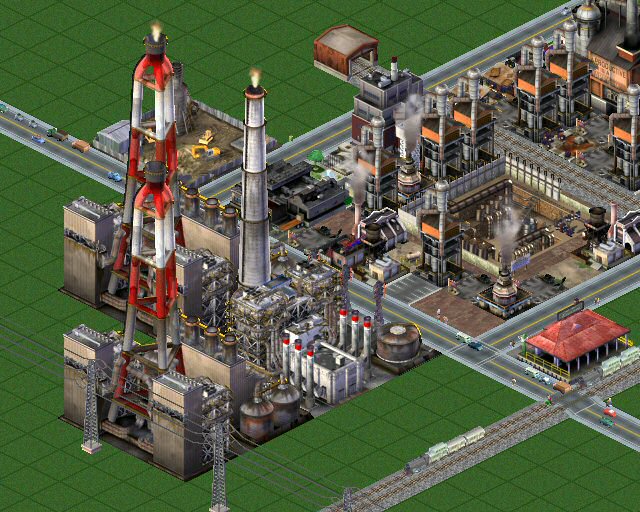
The first acts of the new year were a new power station, gas, of course ...
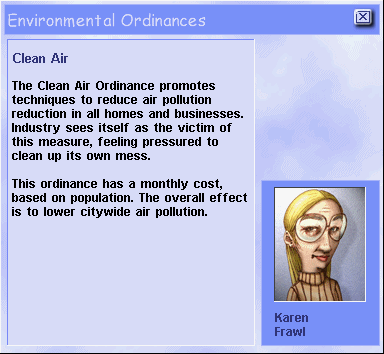
... and rather incongruously, another draconian levy on smoke factories.
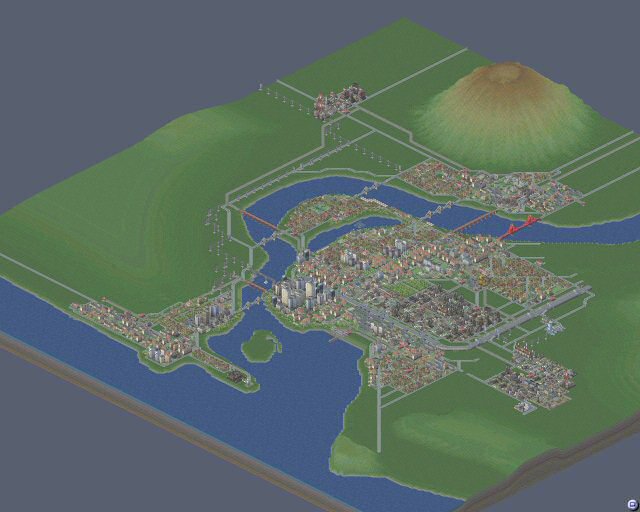
Things were starting to get big.
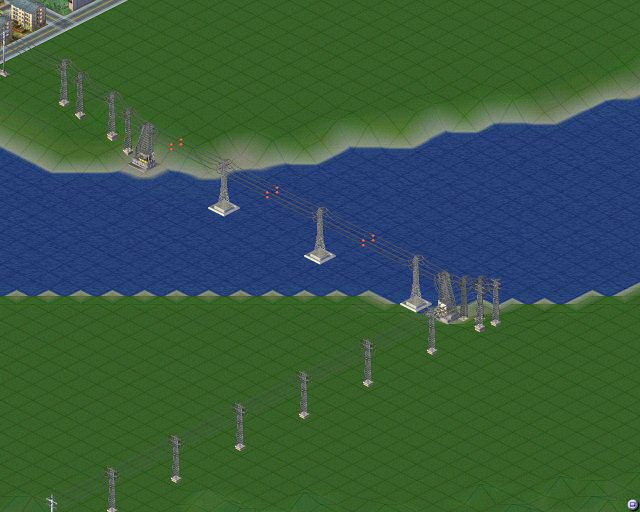
One that really bugged me was the lack of a backup power line over the river, so that was sorted out upriver from the city.
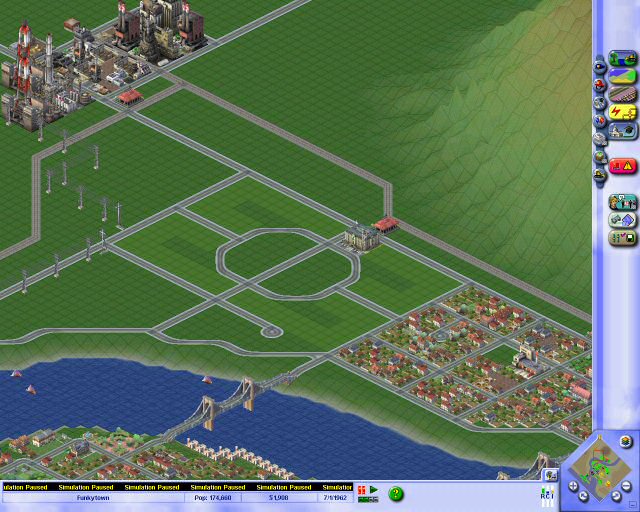
Someone, perhaps Mumblin' Murgatroyd, was getting artistic down at the town planning department, and in any case Firetop Reach had become inscribed in a manner that may or may not have been intended to summon weird phenomena.
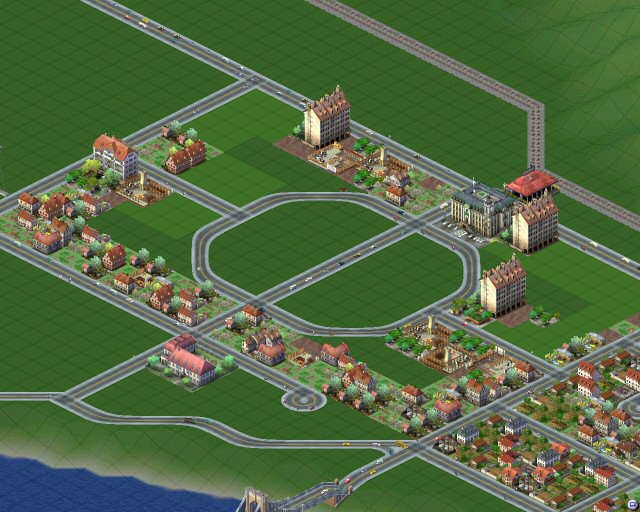
Well, I didn't care what weird phenomena answered the call as long as they paid taxes and didn't behead llamas.
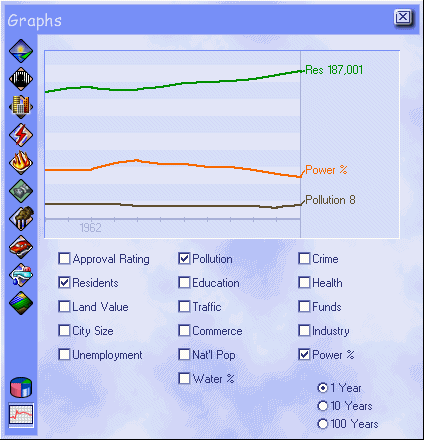
The population was back up to the old level before the unexplained mass migration, so I was breathing a bit easier there.

1963. As the masses returned, so did the ca§§§§h.
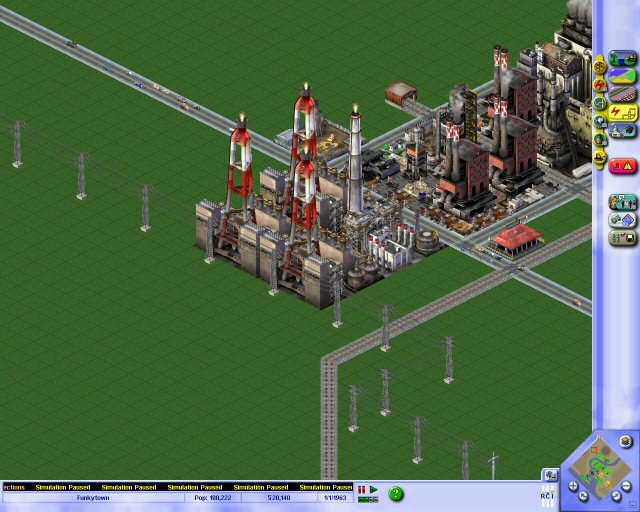
At this stage we were putting down a new gas plant every year just to keep up with increasing demand and the demise of the aging coal fired plants.
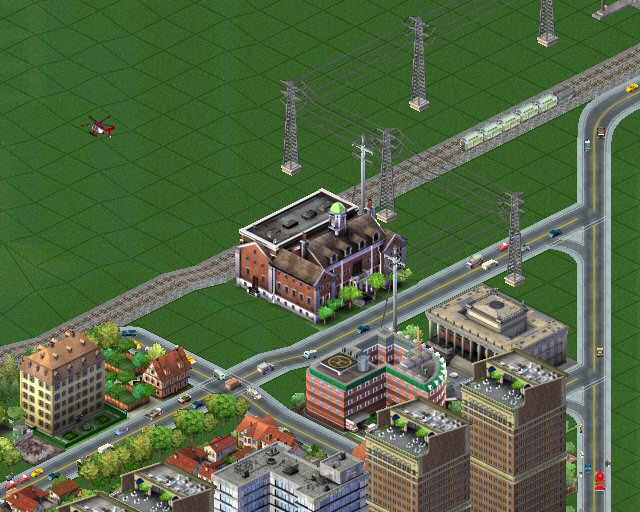
A third college was placed in town, placed in Westshore and so it was called Northside Tech.
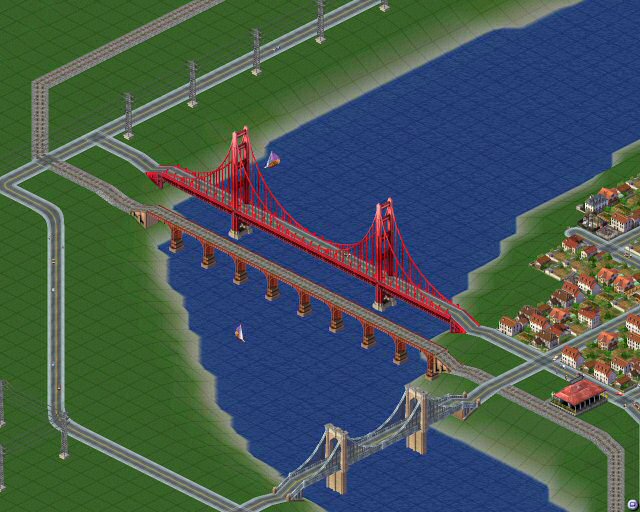
Another bridge was also laid out across the river. It seemed a bit redundant at this stage but it would be needed before too long.

It was 1964 and Beatlemania was sweeping the world, in spite of the fact that they weren't particularly funky.
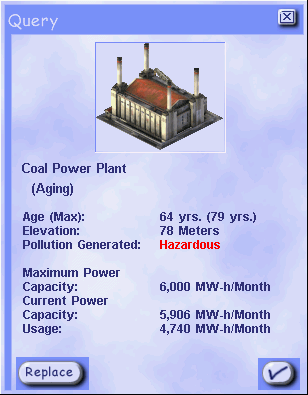
Coal plant #2 was also about to bite the dust.
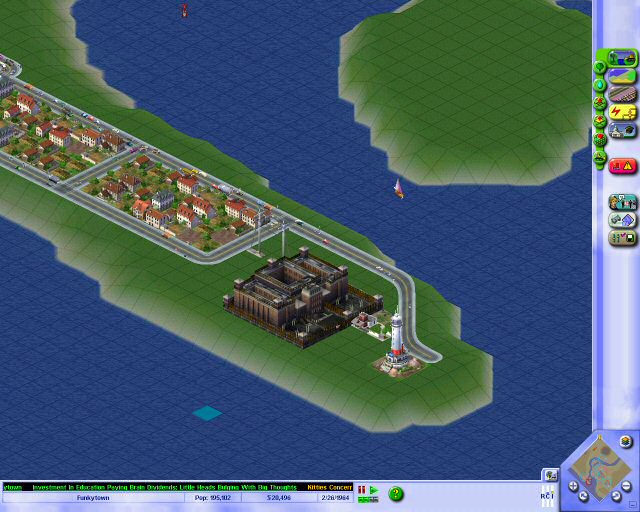
And, finally, time to say goodbye to an old friend. The Penis Peninsula Penitentiary had provided a steady steam of cash to the city for over fifty years, but as that flow of income became a relatively insignificant budget item, I felt that it was time to shut it down.
The prison's reputation had recently become sullied when The Funkytown Boogle had revealed that it had received evidence that the warden had been embezzling funds while using the prison as a de facto labour hire firm. While the idea of using prisoners as cheap labour wasn't so much of a problem in itself, however as the enterprise undercut other businesses on contracts, so many of these offered the warden under-the-table payments in exchange for the prison enterprise not offering competing tenders for building projects around town. When the evidence was revealed in the paper, detectives went to the prison to arrest the warden only to find that he had shot himself rather than face trial.
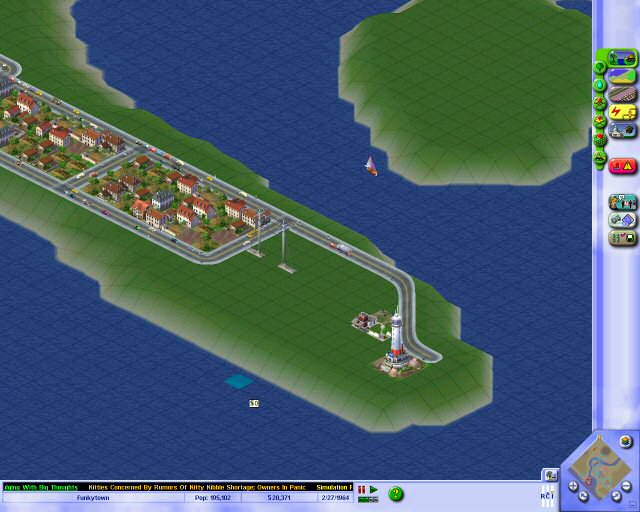
It disturbed me that many of the city's own construction projects had used prison labour to cut costs - not so much because I disliked the idea of prisoners working on day release, I felt it was a useful method of rehabilitation, but the whiff of corruption in the way the warden had orchestrated the rort was too much, even for me. I did hear that he had the help of a particular prisoner in keeping the rort going. The prisoner had recently escaped without trace, at which point the whole enterprise began to fall apart. It was also reasonable to suspect that it was the escapee who, once on the outside, had supplied the newspaper with the evidence implicating the warden.
Of course, I had every right to suspect my own name might be tarnished by association, and I decided that we would be better off without the facility. In this light we were able to end the contract without penalty, and free up the peninsula for housing. As the prison was decommissioned, one inmate, Jonah Ennis or "The Butcher of Buttsville", who'd been housed there since its opening was finally released on parole. Far from being happy that he was finally on the outside, the first thing he did on release was climb to the top of the lighthouse and hurl himself to his death.
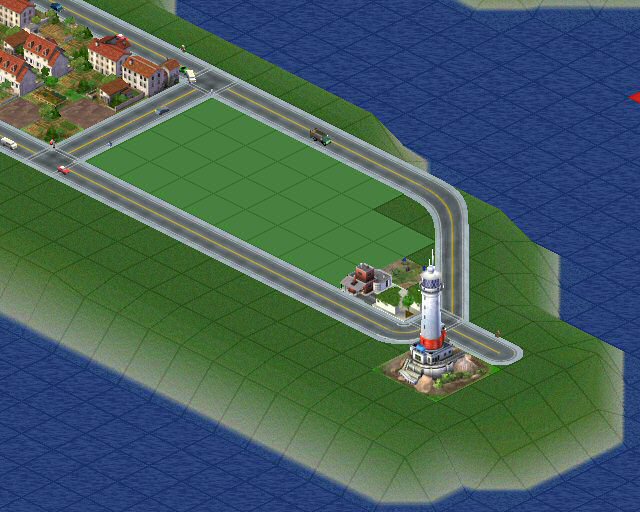
It seemed to me that there would be a lot of ghosts lurking around the peninsula.

So it went. The city wouldn't miss the prison, that source of income had served its purpose of providing what as effectively seed income for a growing town, but by this stage it was no longer needed. Apparently those jerks at RuPaul had jumped at the chance to become the new destination for the mass murderers and serial rapists of the state, and they were welcome to it.

The population seemed to flag a bit, but at least there weren't any mass migrations this time. 200,000 was in reach, but I might need to think about (gasp!) dropping taxes yet again.
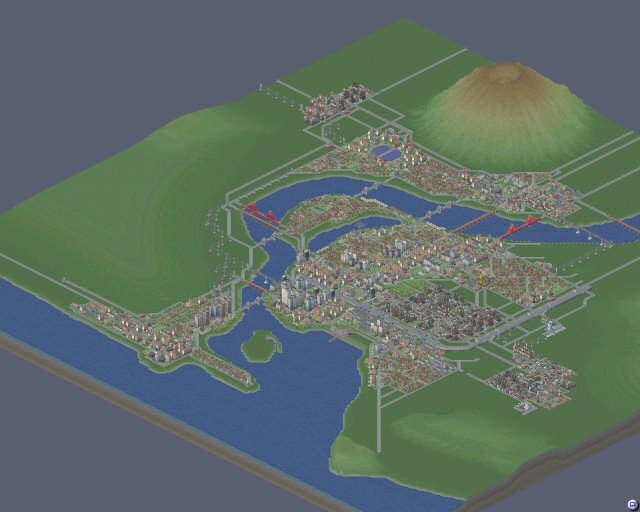
For all of that, the city residents seemed satisfied, as was I, that we had gained a stadium and lost a prison in the past five years. The Rovers had found their feet in the SimNation First Division, though they were far from title contenders, and I regularly made it to home games as number one ticket holder.